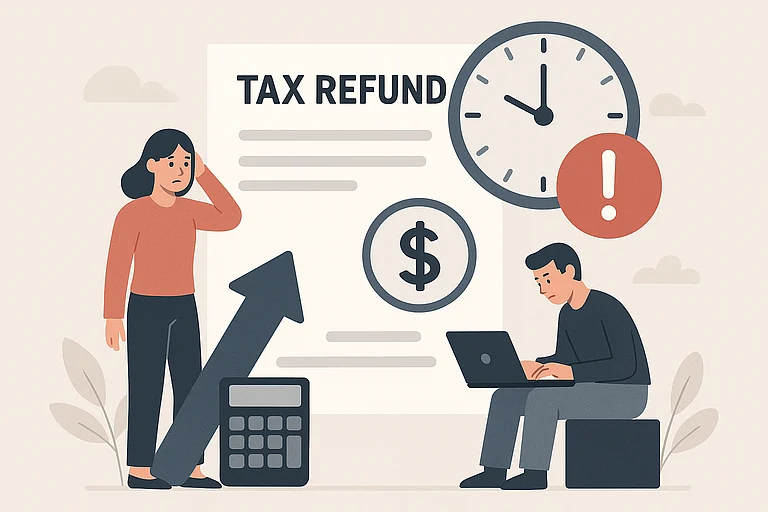Filing your income tax return on your own can feel like a small personal victory, until it backfires. With tax-filing portals getting smoother and pre-filled forms offering a sense of confidence, many salaried individuals choose to skip a professional's help, because they can. However, it is essential to know that there are some common errors that can throw the whole process off track.
Self-Filing Your ITR? Watch Out For These 3 Mistakes That Catch Many Off-Guard
Learn more about these three common missteps that could trigger a notice, or worse, a demand for additional tax with interest and penalty
And it happens more often than you would have thought. The tax department issued over 22,000 mismatch notices under Section 143(1) in the financial year (FY) 2022–23, according to TaxBuddy.com, an income tax filing assistance platform. More than half of these were sent to salaried taxpayers, largely for mistakes that were not about evasion, but simple oversights. You think you have declared everything, but the system picks up a discrepancy you may not have noticed.
Here's a look at three common missteps that could trigger a notice, or worse, a demand for additional tax with interest and penalty.
1. HRA Claims Without a Clear Trail
Claiming House Rent Allowance (HRA) is standard practice, especially for those living in rented accommodation. But just entering your rent amount is not enough.
The tax department flags HRA claims that do not show a clear trail, especially when the rent is paid to a close relative or when there is no actual evidence of payment. Even if you have submitted documents to your employer during the year, those are not checked again at the ITR stage. But if your return gets picked for scrutiny later, you may be asked to show everything, from rent receipts and the rental agreement to proof of bank transfers.
What catches many people off guard is how easy it is to misplace the claim under the wrong section or miss a detail, leading to the exemption being rejected entirely. And once that happens, the tax demand kicks in, along with penalties and paperwork.
2. Mismatch Between Form 16 and 26AS
Form 16 from your employer tells you what salary you earned and how much tax was deducted. However, the Income Tax Department does not rely on that alone. They match everything against Form 26AS, a more detailed record of all TDS (Tax Deducted at Source) entries, whether from your salary, bank interest, or any other source linked to your PAN.
If you forgot to report interest from a fixed deposit or freelance income that had TDS deducted, it shows up in 26AS, even if it is not in your Form 16. That mismatch is enough to delay your refund or trigger a notice.
It gets trickier when people assume interest from fixed deposits (FDs) or refund interest from the IT Department is not taxable. It is important to know that interest income earned from fixed deposits is fully taxable and should be reported under 'Income from Other Sources' during ITR filing. Even if the amount seems small, it needs to be declared.
3. Missing Side Incomes and Disclosures
Many people simply don't realise how many types of income they are expected to report, even if they think it is not taxable. For instance, side gigs, investment gains, dividends, interest, ESOPs, crypto earnings, and even income earned in a child's name, in some cases, all of it has to be included.
What's changed is that the IT Department already has most of this information through its newer data collection tools. Not mentioning these details in your return doesn't hide them; it just increases the chances of a mismatch.
Also, it is worth checking your bank details. Refunds are credited to the account you enter in your ITR. A single digit off in the account number or IFSC code can lead to weeks of delay.
Self-filing your return is good but one must ensure they are doing it rightly. A bit of double-checking, especially cross-verifying Form 16 with 26AS and reporting every income stream, no matter how small, can save you from unexpected tax demands and long resolution trails later.



